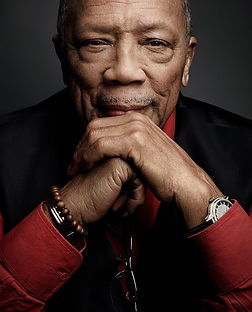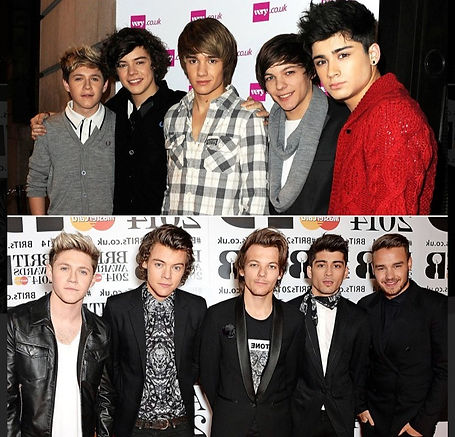
Chloe Koe Mae
IUPUI W 131 ePortfolio


Draft Below this
Quick Overview: This page is about Quincy Jones. It basically goes over the film that was posted on Netflix and a brief history of his childhood and music.
Review of Quincy: The Original Soundtrack, A Life Beyond Measure
December 17, 2020
Quincy, the documentary, was released on September 21, 2018. It was released on Netflix and was produced by Paula Dupré Pressmen and starring by Quincy Jones. The film was co-written and co-directed by Rashida Jones and Alan Hicks. Rashida Jones and Alan Hicks are the directors. They won 3 awards including the Grammy Award for Best Music Film. Quincy’s daughter Hick was the one who directed mostly the film and was behind the film about their father.
When readers read this documentary, it will help readers learn more about Quincy Jones. It will educate the reader about how he grew up. The reader will learn more about his musical background. My target audience includes readers, students who are interested in music deciding to major in music. They can be any age that just simply wants to watch a documentary. It can also be someone who likes to learn more about music and would like to know more about the struggle of one person who can actually reach his goal. The audience of this documentary will learn more about what Quincy is like before he reaches his goal. The set-piece provides a brief struggle of what he faces. The first page talked about when the documentary was released, and it also provided a little detail about his mom, plus biographical information on the director.
The genre of this film is music. It is about Quincy’s life as a singer, film producer, and American record producer. In the documentary, Quincy stated, “He went there and change all of those notes that he had written before” (Jones). He is so appreciated he got to be in the greatest band in the world, it always amazes him that someone can do that and change his notes up that fast. He seems to admire Francis's skills. Throughout the film, there were many black and white pictures to connect his story as well as older short clips. In the film, Quincy was saying, "it turns out to be harder than I thought, plowing through piles of demo tapes, listening to bad songs” (Jones). He went out to get himself a job after he had no more money knowing that it’s time to go home. The struggle he faced is that there are still racist people calling him names and try to do what he loves to do is challenging for him. This document shows different struggles throughout the film and when you watch you’ll find out more about what happened.
In the review article, Andrew Barker stated, “not always successfully – to play an elder statesman role to the hip-hop generation” (Barker). Quincy went through so much through up and down in life. The fact that his mom didn’t really support him is hard for him. His mom followed him to one of his performances without Quincy knowing telling him he didn’t want him to do music just for anyone but only for god. “We see photos of the very young Jones in his bleak old neighborhood of Chicago, where he endured the Depression at its worst” (Barker). He wanted to tell about his rough childhood Childhood. His struggle throughout the film is what makes him who he is as of today. In order to be where he’s at, there’s a step to it. He has to hop from one job to another job working for artists as long as they pay him, getting into from one band, a concert to another. But, when he doesn’t have money anymore, he knows that’s when it’s time to go home. Even though he had unstable jobs working for others going from nothing to something, his accomplishment, and what he had to do was worth it at the end of the day.
The story in Quincy was cool how they put videos of him back in the days to what he is of today. The way the documentary is put together is that Quincy talked over the video of what he does and the people who are responsible for the video show a short video of his action and what is going on. It goes back and forth from what happened to him for example when he had the stroke to a video of him during the concert. The Film Review: 'Quincy' Andrew Barker wrote: "But he also carries a far deeper scar from his youth" Quincy has experienced so much when he was younger. The struggle he faced, even when depression is at its worst, he endures it all. The audience can see that through all of these, he made it by making a name for himself as a film composer and his achievement is worth it. In the film, Quincy said, "you want to be what you see" and also said, "you have to dream so big that you can't give an ego" after his daughter asked him how he deals with his ego and your art. He first wanted to be was someone who will not be beneficial to his life in the future because like he said I the quote, you want to be what you see but then, he sees music. The audience can see music offered his freedom and that he tries hard and have fun at the same time to be where he's at. As a viewer, we know that nothing in life is easy, we must share the pain. As we watch this, we share his struggle and learned what has happened in his lifetime. This film is a good documentary. It’s not just about making music or writing, it’s to remind everyone that there is always a struggle to get to where you are today. Anyone can watch this documentary if they are interested in music and what it’s like to try to reach your goal in his time, learn a little history during this time, and wanted to learn more about who Quincy Jones is. Even if any one of these doesn’t interest you, you can still check it out because it’s interesting. A group of college students, friends, cousins, or even by yourself can find and watch this on Netflix.
Works Cited
Barker, Andrew. “Film Review: 'Quincy'.” Variety, Variety, 18 Sept. 2018,
variety.com/2018/film/reviews/quincy-film-review-toronto-1202933857/.
“Quincy.” IMDb, IMDb.com, 21 Sept. 2018, www.imdb.com/title/tt7440432/.
“Quincy.” Netflix Official Site, Netflix, 21 Sept. 2018, www.netflix.com/watch/80102952?trackId=13752289.
-----------------------------------------------------------------------------------------------------------------------------
Draft - Film Review
October 09, 2020
Review of Quincy: The Original Soundtrack, A Life Beyond Measure Quincy, the documentary, was released on September 21, 2018. It was release on Netflix and was produced by Paula Dupré Presmen and starring by Quincy Jones. The film was co-written and co-directed by Rashida Jones and Alan Hicks. Rashida Jones and Alan Hicks are the directors. They won 3 awards including the Grammy Award for Best Music Film. Quincy’s daughter Hick was the one who directed mostly on the film and was behind the film about their father. The genre of this film is music. It is about Quincy’s life as a singer, film producer and American record producer. In the documentary, Quincy stated, “He went to there and change all of those notes that he had written before” (Jones). He is so appreciated he gets to be in the greatest band in the world, it always amazes him that someone can do that and change his notes up that fast. He seems to admire Francis skills. Throughout the film, there were many black and white pictures to connect his story as well as older short clips. In the film, Quincy was saying, "it’s turns out to be harder than I thought, plowing through piles of demo tapes, listening to bad songs” (Jones). He went out to get himself a job after he had no more money knowing that it’s time to go home. The struggle he faces are that there’s still racist people calling him names and try to do what he loves to do is challenging for him. This document shows different struggle throughout the film and when you watch you’ll find out more about what happen. In the review article, Andrew Barker stated, “not always successfully – to play an elder statesman role to the hip-hop generation” (Barker). Quincy went through so much through up and down in life. The fact that his mom didn’t really supported him is hard for him. His mom followed him to one of his performance without Quincy knowing telling him he didn’t want him to do music just for anyone but only for god. “We see photos of the very young Jones in his bleak old neighborhood of Chicago, where he endured the Depression at its worst” (Barker). He wanted to tell about his rough childhood in Childhood. His struggle throughout the film is what makes him who he is as of today. In order to be where he’s at, there’s a step to it. He has to hop one job to another job working for artists as long as they pay him, getting into from one band, concert to another. But, when he doesn’t have money anymore, he knows that’s when it’s time to go home. Even though, he has unstable jobs working for others going from nothing to something, his accomplishment and what he had to do was worth it at the end of the day. The story in Quincy was cool how they put videos of him back in the days to what he is of today. The way the documentary is put together is that Quincy talked over the video of what he does and the people who is responsible for the video show a short video of his action and what is going on. It goes back and forth to what happened to him for example when he had the stroke to a video of him during the concert. The Film Review: 'Quincy' Andrew Barker wrote: "But he also carries a far deeper scar from his youth" Quincy has experienced so much when he was younger. The struggle he faces, even when depression is at its worst, he endures it all. The audience can see that through all of these, he made it by making a name for himself as a film composer and his achievement is worth it. In the film, Quincy said, "you want to be what you see" and also said, "you have to dream so big that you can't give an ego" after his daughter asked him how he deals with his ego and your art. He first wanted to be was someone who will not be beneficial to his life in the future because like he said I the quote, you want to be what you see but then, he sees music. The audience can see music offers his freedom and that he tries hard and have fun at the same time to be where he's at. As a viewer, we know that nothing in life is easy, we must share the pain. As we watch this, we share his struggle and learn what has happened in his lifetime. This film is a good documentary. It’s not just about making music or writing, it’s to remind everyone that there is always a struggle to get to where you are today. Anyone can watch this documentary if they are interested in music and what it’s like to try to reach your goal in his time, learn a little history during this time and wanted to learn more about who Quincy Jones is. Even if anyone of these doesn’t interest you, you can still check it out because it’s interesting. A group of college students, friends, cousin,s or even by yourself can find and watch this on Netflix.
Works Cited
Barker, Andrew. “Film Review: 'Quincy'.” Variety, Variety, 18 Sept. 2018, variety.com/2018/film/reviews/quincy-film-review-toronto-1202933857/.
“Quincy.” IMDb, IMDb.com, 21 Sept. 2018, www.imdb.com/title/tt7440432/.
“Quincy.” Netflix Official Site, Netflix, 21 Sept. 2018, www.netflix.com/watch/80102952?trackId=13752289.




Immersion Experience - notes


On October 14, 2020, I listened to a few of Big Time Rush music and One Direction and take notes. I also looked at articles back in the days and wrote down information briefly. I was able to learn more about Big Time Rush. My Immersion experience went well, I was able to learn and enjoy the music.
Reflect:
The experience is what I expected. Listening to both of the boy's group songs is fun and I was able to enjoy their songs. The three moments from the experience that I wanted to write is their vibes and energy, the song itself, and their popularity. My favorite part of the immersion experience is the music itself, I really enjoy the music and the meanings.


Works Cited
Caramanica, Jon. “Riding the Boy Band Wave While It Lasts.” The New York Times, The New York
Times, 14 Nov. 2012, www.nytimes.com/2012/11/15/arts/music/one-direction-rides-boy-band- (Links to an external site.)
wave-with-take-me-home.html.
Vick, Megan. “Big Time Rush Brings Boy Bands Back.” Billboard, 13 Oct. 2010,
www.billboard.com/articles/news/954228/big-time-rush-brings-boy-bands-back.
Sherman, Maria. “One Direction's Big Bang.” NPR, NPR, 23 July 2020,
03 clients
I'm a paragraph. Click here to add your own text and edit me. It’s easy. Just click “Edit Text” or double click me to add your own content and make changes to the font. I’m a great place for you to tell a story and let your users know a little more about you.